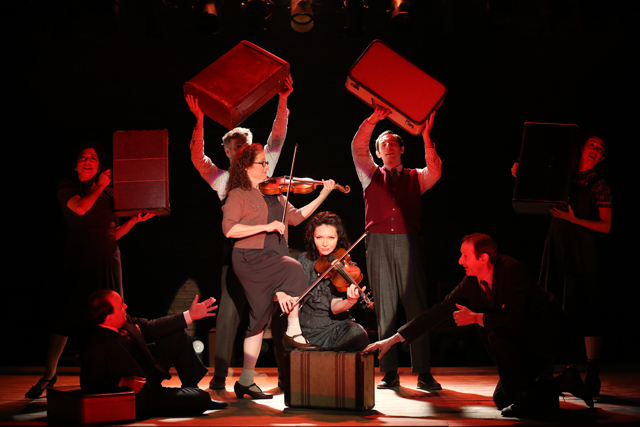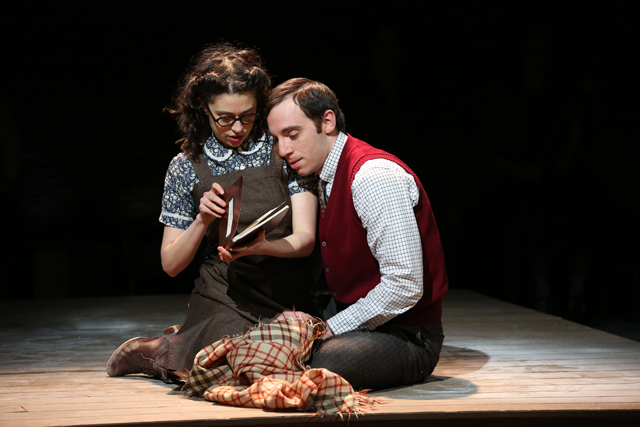
INDECENT takes audiences behind the scenes of controversial drama THE GOD OF VENGEANCE (photo by Carol Rosegg)
Vineyard Theatre
Gertrude and Irving Dimson Theatre
108 East 15th St. between Union Square East & Irving Pl.
Extended through June 19
www.vineyardtheatre.org
A quartet of current or returning shows in New York City are as much about their back stories as the central plays themselves, all of which date from the 1920s. The first two are straight-up revivals, reconstructed after years of intense research: The National Yiddish Theatre has resurrected The Golden Bride, from the Golden Age of Yiddish theater; the operetta returns to the Museum of Jewish Heritage in July following a widely hailed production at the end of last year. I’ll Say She Is at the Connelly Theater revives the Marx Brothers’ long-lost Broadway debut, lovingly patched together by Groucho impersonator Noah Diamond. The two others are plays-within-plays. On Broadway at the Music Box Theatre, Shuffle Along goes behind the scenes to detail “the Making of the Musical Sensation of 1921 and All That Followed.” And now, in the Vineyard Theatre’s New York premiere of Indecent, Pulitzer Prize-winning playwright Paula Vogel (How I Learned to Drive) and director Rebecca Taichman (Familiar, Marie Antoinette) take a powerful look at Sholem Asch’s controversial drama The God of Vengeance, which, when it came to Broadway in 1923, resulted in the arrest of members of the cast and crew on obscenity charges. (The new play was inspired by Taichman and Rebecca Rugg’s 2000 The People vs. the God of Vengeance.) The hundred-minute show alternates between scenes from Asch’s (Max Gordon Moore) first play and what went into the creation of The God of Vengeance, which was decried as being anti-Semitic even by Asch’s friends and colleagues, as it tells the story of a devout Jewish man (Tom Nelis) who is running a brothel in his basement in order to be able to afford a better life for his daughter (Adina Verson), who instead falls in love with one of the prostitutes (Katrina Lenk). Lemml (Richard Topol) serves as the narrator of Indecent, explaining how he became the stage manager of The God of Vengeance as it toured Europe and America but is unable to remember how the play ends.

Madje (Adina Verson) and Sholem (Max Gordon Moore) have no idea what a furor his first play will cause (photo by Carol Rosegg)
Much of the cast takes on multiple roles; Nelis also portrays Asch’s mentor as well as Rudolph Schildkraut, the star of The God of Vengeance, Verson is also Asch’s wife, Madje, and Steven Rattazzi plays another colleague of Asch’s in addition to producer Harry Weinberger. (The excellent cast also features Mimi Lieber.) Even the Klezmer musicians, violinist Lisa Gutkin, accordionist Aaron Halva, and clarinetist Mike Cohen, occasionally double down. The primary controversy revolves around a lesbian kiss, which is reenacted over and over with poetic grace, the women dressed in angelic white costumes (by Emily Rebholz). Most of the action occurs on a slightly raised wooden platform (the scenic design is by Riccardo Hernandez), with the cast often sitting on chairs lined up against the back wall, on which Tal Yarden’s projections give the time and place, announce when there’s a “blink in time,” and tells the audience what language is theoretically being spoken, which is particularly effective when Lemml speaks in his non-native tongue and suddenly is talking in broken English. There are a few musical numbers, including “Bei Mir Best du Schon (Means That You’re Grand),” and David Dorfman’s choreography is subtly sensational, especially a breathtaking moment when the cast members of the show-within-a-show each grabs their suitcase, which are piled on top of one another, evoking a vertical Zoe Leonard installation. And when it’s all over, it becomes clear why Lemml doesn’t remember the ending, a haunting conclusion that you won’t soon forget.